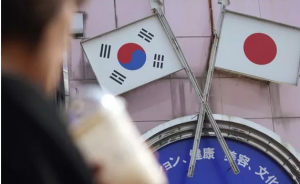Japanese media reported on November 22 that economic relations between Japan and South Korea are cooling.Japan’s exports to South Korea in October showed double-digit negative growth in a number of sectors, including chemicals and general machinery, the report said. Imports from South Korea fell 12 percent, the 10th straight month of decline.

“The move is to properly manage trade in goods and technology that could be diverted to the military,” the report said, stressing that it was in no way in violation of WTO agreements. South Korea called the measure “arbitrarily discriminatory” and demanded it be reversed. During the negotiations, the two sides did not discuss the abandonment of the military intelligence protection agreement (GSOMIA), which expired on the 23rd.
In future, the report said, South Korea could ask Japan for a third round of consultations, or for the WTO to set up a dispute settlement panel, the equivalent of a first instance. At the press conference after the consultation between Japan and South Korea, ding haiguan said on the establishment of the expert group, “is an option.” On that basis, it said, “if there is a possibility to resolve the issue, consultations will continue, but we do not wish to discuss it for the sake of discussion.”
According to the website of nihon keizai shimbun, the trade rivalry between Japan and South Korea is likely to become permanent
Japanese media: in the block chain sector, the number of Chinese patent applications is three times that of the us.
Japanese media have reported that Chinese companies have filed three times as many patents as the us in “blockchain”, the core technology alongside artificial intelligence. Blockchain will continue to be applied to core infrastructure such as digital currency and logistics. If they take the lead in this area, they are likely to gain an edge in new services and international financial markets. By country, the us-china pattern is clear.
Based on the cumulative number of applicants’ country observations, China has about 7,600 applications, accounting for more than 60% of the total and three times as many as the United States (about 2,600). In terms of years, the U.S. overtook China as of 2015, but has reversed since 2016. Japan ranked fourth, with a total of about 380 as of 2018, less than South Korea (about 1,150). In recent years, the use of blockchain is expanding. The development of new production and logistics management to improve food safety and new education systems to complement learning experiences is expected. Blockchain has also received attention as a core technology in digital currencies prepared by the central Banks of China and Sweden, the report said.